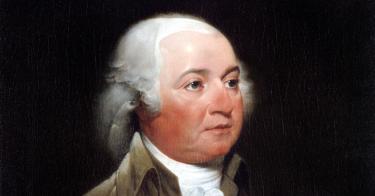That the brilliant wordsmith Thomas Jefferson was the principal author of the Declaration of Independence is indisputable, but a lesser-known fact is that the man who played the indispensable role in its adoption by the Continental Congress in July 1776 was John Adams of Massachusetts, our second president.
Jefferson later confirmed Adams’ role as the tireless “floor manager” of the Declaration:
No man better merited than Mr. John Adams to hold a most conspicuous place in the design. He was the pillar of its support on the floor of Congress, its ablest advocate and defender against the multifarious assaults encountered.
As historian David McCullough has written, tension in the congressional debate was heightened by the sighting of a hundred British ships off New York, the first arrivals of a fleet that would number over 400. So serious a step as independence warranted unanimity among the colonies, but Delaware and Pennsylvania remained question marks.
Just as the doors of Congress were about to be closed, Caesar Rodney of Delaware arrived, “booted and spurred.” Although suffering from skin cancer, Rodney had ridden 80 miles through the night, changing horses several times, to cast his “aye” vote for independence.
More important to the cause, McCullough writes, were two empty chairs in the Pennsylvania delegation. Unwilling to vote for independence, but acknowledging the need for Congress to be unanimous, John Dickinson and Robert Morris “had voluntarily absented themselves from the proceedings,” placing Pennsylvania behind independence by the narrow margin of 3-2.
On the final day of debate, when adoption of the Declaration by all 13 colonies was still in doubt, Adams rose to speak “with a power of thought and expression,” Jefferson wrote, “that moved us from our seats.”
To Richard Stockton, a new delegate from New Jersey, Adams was “the atlas” of the hour, “the man to whom the country is most indebted for the great measure of independency.”
Today, some 241 years later, we remain awed by the courage of the delegates assembled in Philadelphia who declared their independence from England, then the most powerful nation in the world, and pledged their lives, their fortunes, and their sacred honor to a new nation—the United States of America.
While Jefferson himself penned the Declaration of Independence, it was Adams more than anyone else who was responsible for its adoption. He more than any other delegate understood how consequential the Declaration would be, writing to his beloved wife Abigail:
The second day of July 1776 will be the most memorable epocha in the history of America. I am apt to believe that it will be celebrated by succeeding generations as the great anniversary festival.
It ought to be commemorated as the Day of Deliverance by solemn acts of devotion to God Almighty. It ought to be solemnized with pomp and parade, with shows, games, sports, guns, bells, bonfires, and illuminations from one end of this continent to the other from this time forward forever more.
So, let the illuminations begin!
This piece originally appeared in The Daily Signal



